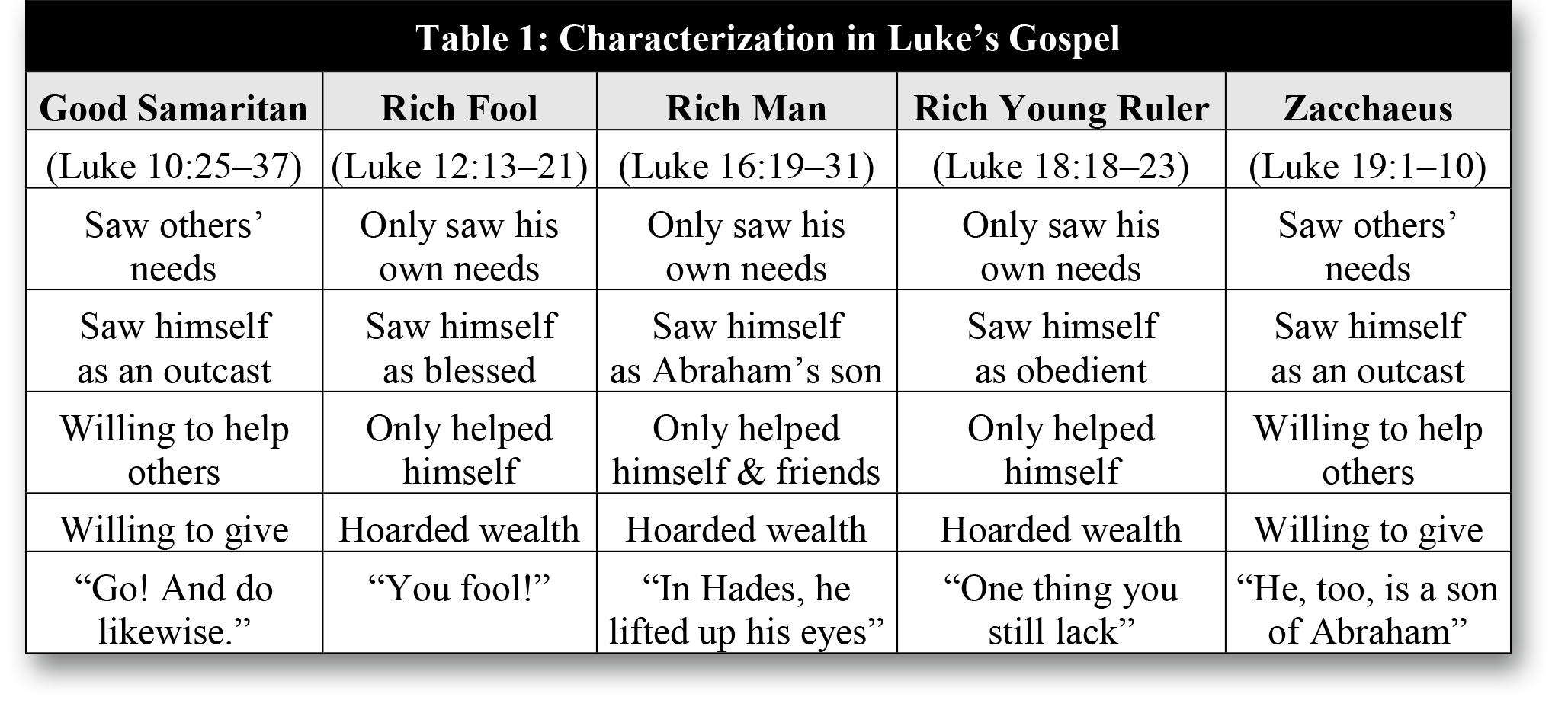Editor’s Note: This is part 2 of a multi-part series. Read Part 1.
How Does Luke’s Gospel Intersect with Faith, Work, and Economics (FWE)?
FWE provides Christians practical tools (e.g., personal vision; gifts and talents; wisdom and knowledge; stewardship; and biblical self-interest) to grasp Luke-Acts, and to live in step with God’s Spirit and mission. Studying Luke-Acts through the lenses of FWE has a reciprocal, synergizing benefit in that Lukan characters illustrate FWE’s principles.
Luke offers positive examples in how FWE blesses God, others, and self (e.g., the “worthy worker” maxim [Luke 10:7] and the Good Samaritan [Luke 10:25–37]). However, Luke also shows its abuses (e.g., the Rich Fool [Luke 12:13–21], the Rich Man [Luke 16:19–31], and the Rich Young Ruler [Luke 18:18–30]). This contrast is illustrated in Table 1 below.[1]

In the characters above, Luke contrasts their differing attitudes toward wealth. The selfless, sacrificial attitude of the Good Samaritan is not only contrasted against the selfishness of the Rich Fool and Rich Man, but also against the selfishness of Jesus’s own disciples (Luke 9:46–48). While the Rich Young Ruler prided himself on Torah observance, he still lacked the selfless generosity of Zacchaeus, which Jesus considered evidentiary of true Abrahamic sonship.
We ought to use our resources so that justice and flourishing are promoted to all of humanity.
How Can FWE Be Incorporated in a Course on Luke’s Gospel?
A one-semester course studying Luke and FWE could be accomplished in a seminary or Sunday School (SS) setting. Questions covered could include:
- “Does Luke want all Christians to be poor?”
- “How could God work through us in the workplace?”
- “What can we learn from prosperity, liberation/social approaches?”
- “How do these approaches differ from Luke’s teachings?”
- “What does Luke teach us about God’s provision and workplace ethics?”
- “What can we glean from Luke’s teachings on investing our lives/resources in others?”
The class could be split up into groups assigned one or more questions. Given the size of the class, all these questions (and more) could be explored as the class would present their findings as a community of learners/teachers.
How Does the Presentation of FWE in Luke’s Gospel Intersect with the Great Commission (GC)?
FWE intersects Luke’s GC in three key ways. First, Luke explains that saving faith is an active faith that stands in stark contradistinction to the way of the world. In other words, the path to greatness is the pathway to servanthood and the cross (Luke 22:24–27). Second, to whom much is given, much is required (Luke 12:48). We ought to use our resources so that justice and flourishing are promoted to all of humanity, not just to other Christians. Third, we should invest in the economics of God’s kingdom. The training, equipping, and supplying of the GC work of Christ’s church is costly (Luke 8:3). Many students depend on academic grants and scholarships to attend seminary. In Southern Baptist (SBC) circles, the churches investing in the Cooperative Program (CP) make it possible for six SBC seminaries to train over 21,000 students for God’s kingdom.[2] Who will pay for the missionaries, who often risk their families’ lives—going to the hard places where Jesus’s name is rare or has never been heard? Simply put, Christians, Luke challenges us to prioritize the mission of God in our budgeting and spending.
Synthesis and Concluding Thoughts
A one-semester course on Luke and FWE could be an enriching study for seminary students and laity alike. Luke’s vivid characterization brings the concepts of FWE to life in practical, real-world applications—showing Christians the proper stewardship of resources, as well as the dangers of loving money more than God (Luke 16:14). Important questions, relevant to contemporary Christian living, can be addressed in a group setting to facilitate deeper, more meaningful learning experiences.
While studies on Luke’s Gospel and FWE abound, Luke’s development of FWE in Acts has mostly gone unexplored. Luke’s presentation of FWE in Acts will be the focus of my next article.
Editor’s Note: This article is an installment in the FWE Curriculum Project.
Image Credit: Sharon McCutcheon / Unsplash
[1] Adapted from Gregory E. Lamb, “The ‘Bad’ Samaritan? A View of the Economics of Radical Generosity from Luke 10:25–37,” Intersect, 02 June 2016, https://intersectproject.org/faith-and-economics/bad-samaritan-radical-generosity.
[2] From the 2015–16 academic year: http://www.sbc.net/BecomingSouthernBaptist/FastFacts.asp.



Comments and Pingbacks
2018-04-20 08:26:38
Does Luke Want All Christians to Be Poor? (Part 3) | Intersect
[…] Editor’s Note: This is part 3 of a multi-part series. Read Part 1 and Part 2. […]